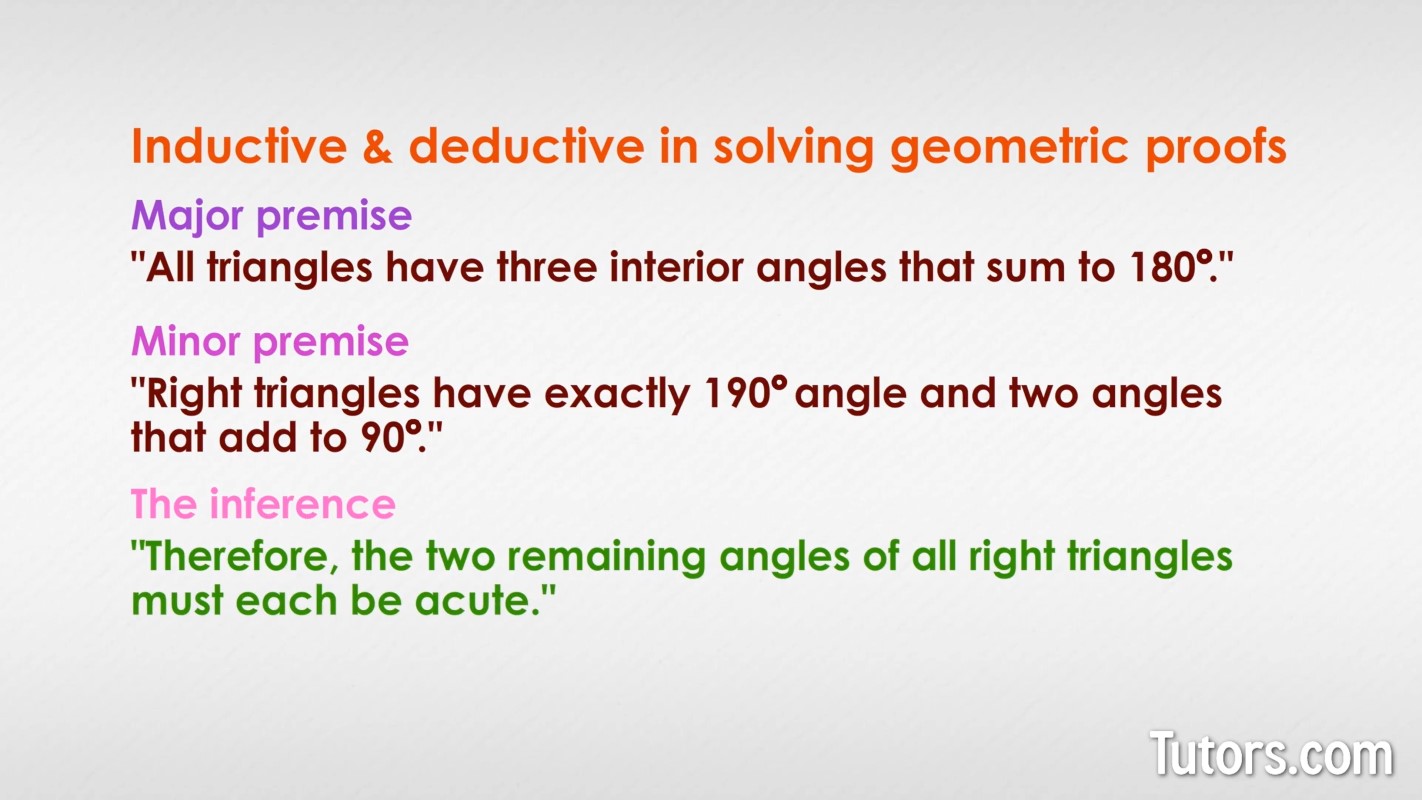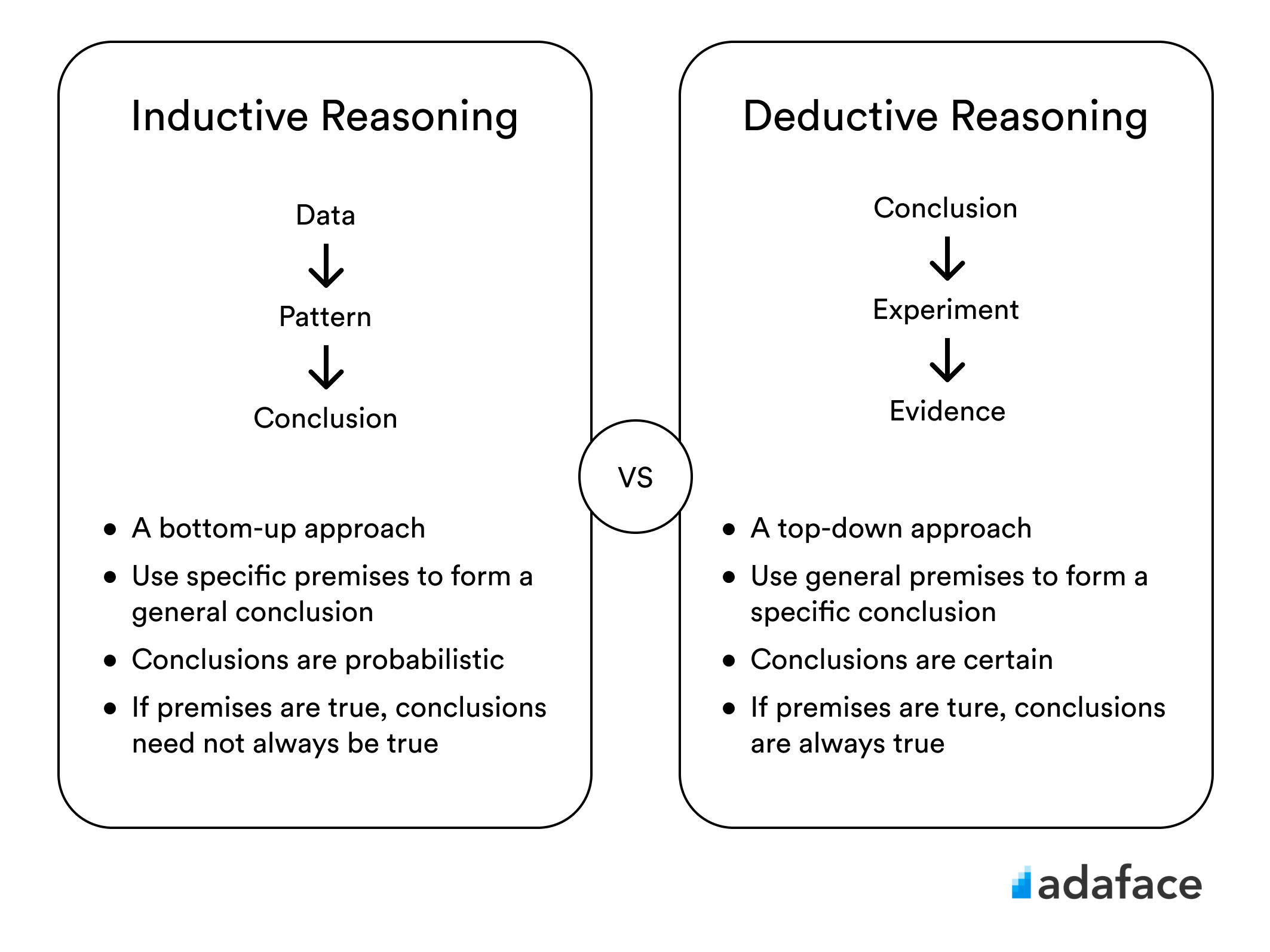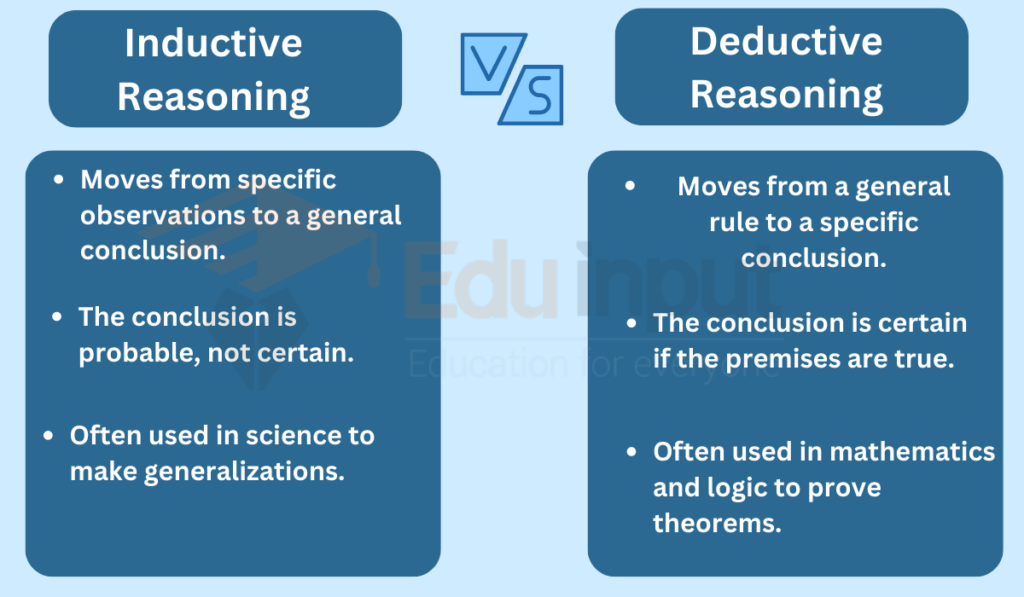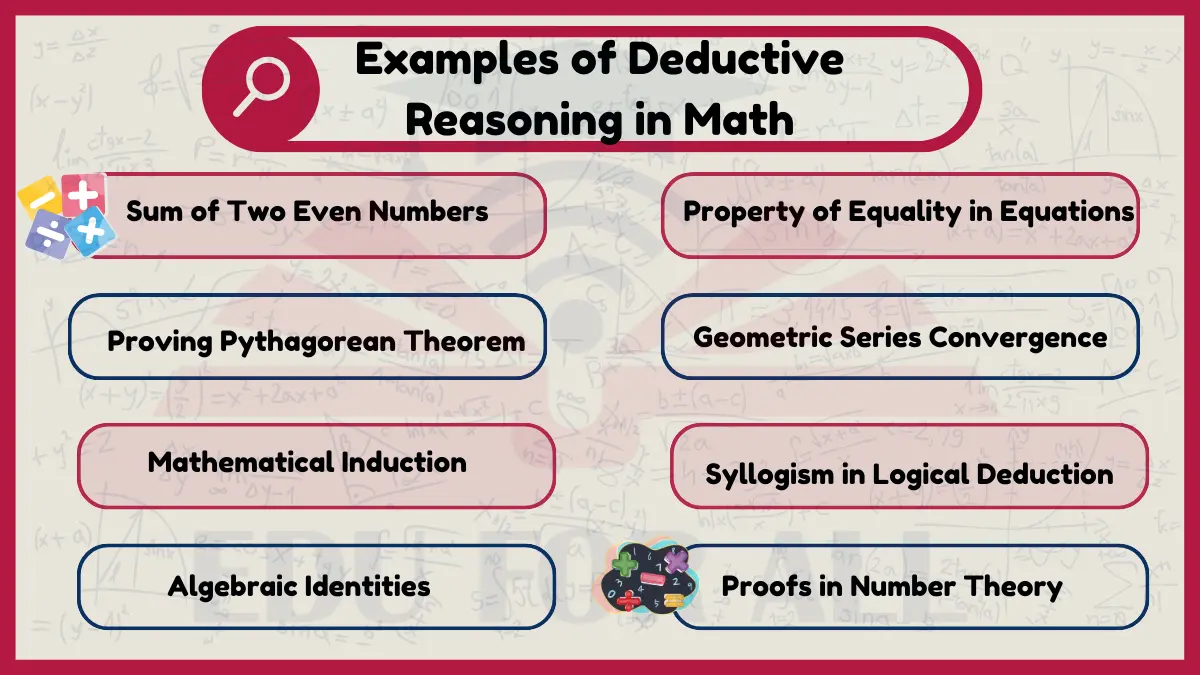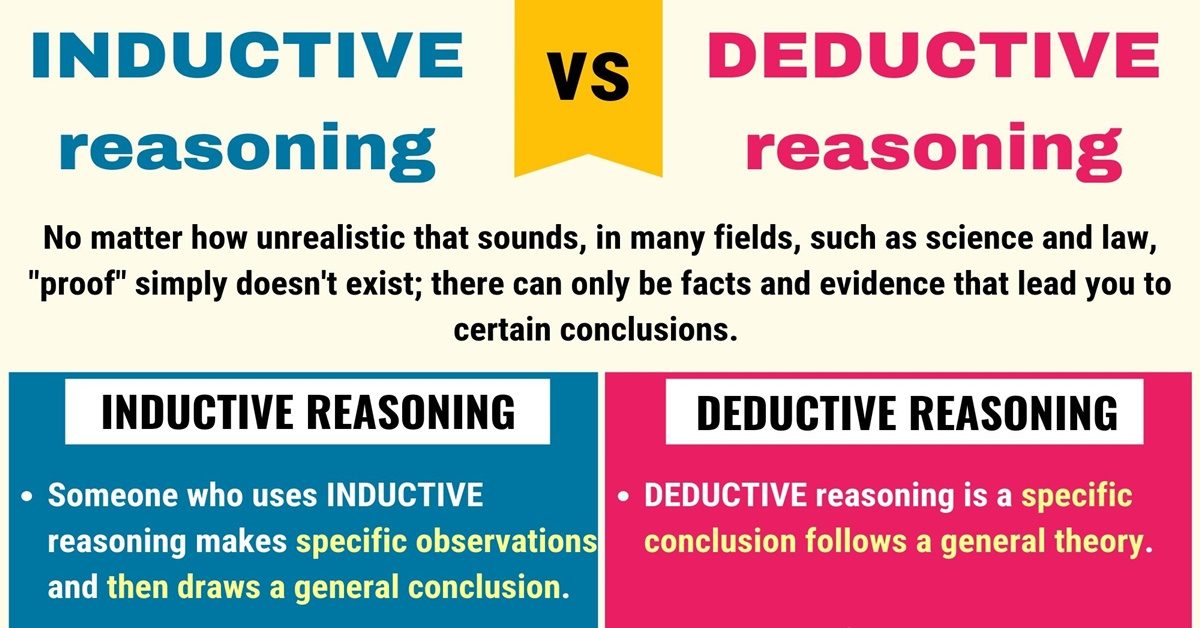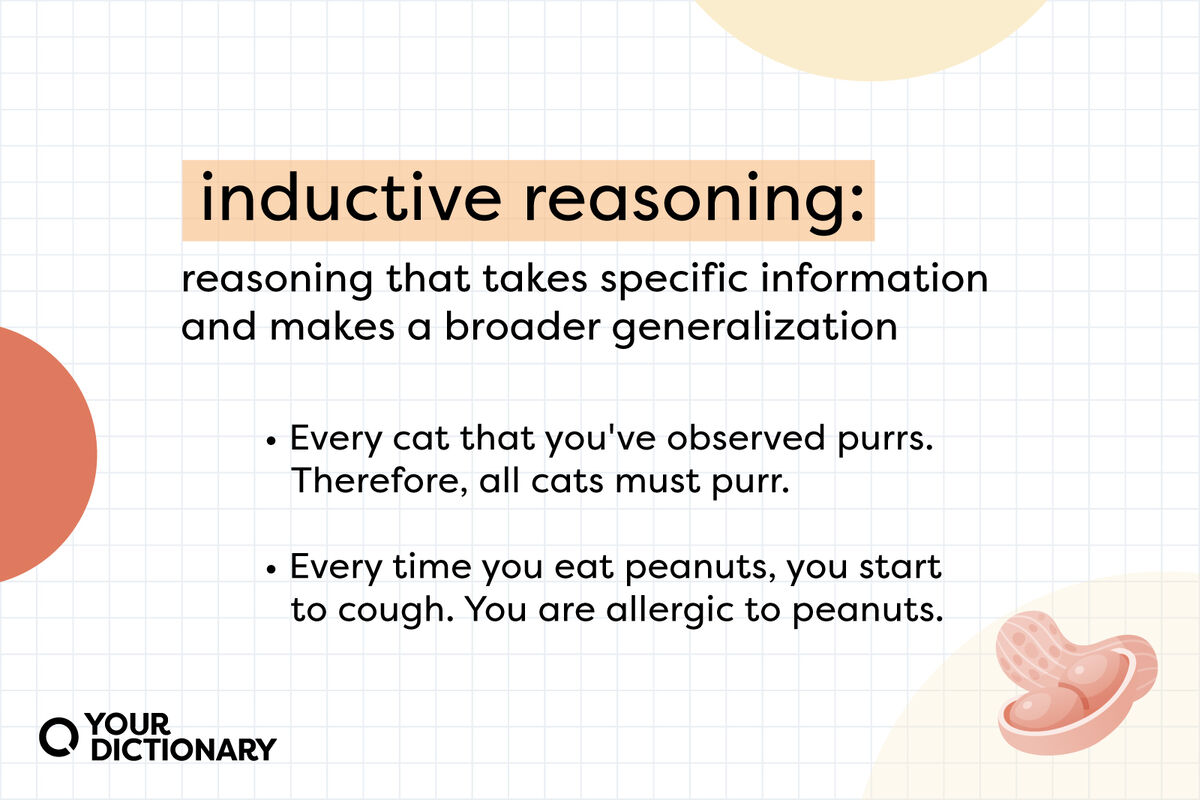Deductive And Inductive Reasoning Examples In Math - Uses a collection of general statements as premises and uses them to propose a specific conclusion. Inductive reasoning is a method of reasoning that involves making generalizations based on specific observations or patterns. Deductive reasoning use existing facts and logic to create a new perfect. Deductive reasoning deductive reasoning is characterized by applying general principles to specific examples. Lots of iq or intelligence tests are based on inductive reasoning. There are 3 main types of reasoning: In math, inductive reasoning typically involves applying something that is true in one scenario, and then applying it to other. Patterns and inductive reasoning are closely related.
Inductive reasoning is a method of reasoning that involves making generalizations based on specific observations or patterns. Uses a collection of general statements as premises and uses them to propose a specific conclusion. Deductive reasoning use existing facts and logic to create a new perfect. Lots of iq or intelligence tests are based on inductive reasoning. In math, inductive reasoning typically involves applying something that is true in one scenario, and then applying it to other. Patterns and inductive reasoning are closely related. There are 3 main types of reasoning: Deductive reasoning deductive reasoning is characterized by applying general principles to specific examples.
Patterns and inductive reasoning are closely related. There are 3 main types of reasoning: Deductive reasoning deductive reasoning is characterized by applying general principles to specific examples. Uses a collection of general statements as premises and uses them to propose a specific conclusion. In math, inductive reasoning typically involves applying something that is true in one scenario, and then applying it to other. Inductive reasoning is a method of reasoning that involves making generalizations based on specific observations or patterns. Lots of iq or intelligence tests are based on inductive reasoning. Deductive reasoning use existing facts and logic to create a new perfect.
Inductive & Deductive Reasoning in Geometry (Definition & Video)
Uses a collection of general statements as premises and uses them to propose a specific conclusion. Inductive reasoning is a method of reasoning that involves making generalizations based on specific observations or patterns. There are 3 main types of reasoning: Deductive reasoning deductive reasoning is characterized by applying general principles to specific examples. Deductive reasoning use existing facts and logic.
Inductive vs Deductive Reasoning (With Definitions & Examples)
Deductive reasoning deductive reasoning is characterized by applying general principles to specific examples. There are 3 main types of reasoning: Lots of iq or intelligence tests are based on inductive reasoning. Uses a collection of general statements as premises and uses them to propose a specific conclusion. Deductive reasoning use existing facts and logic to create a new perfect.
8 Common Inductive And Deductive Reasoning Examples In Everyday Life
Inductive reasoning is a method of reasoning that involves making generalizations based on specific observations or patterns. In math, inductive reasoning typically involves applying something that is true in one scenario, and then applying it to other. Deductive reasoning use existing facts and logic to create a new perfect. Uses a collection of general statements as premises and uses them.
Inductive vs Deductive Reasoning What's the Difference?
Deductive reasoning deductive reasoning is characterized by applying general principles to specific examples. Lots of iq or intelligence tests are based on inductive reasoning. In math, inductive reasoning typically involves applying something that is true in one scenario, and then applying it to other. There are 3 main types of reasoning: Patterns and inductive reasoning are closely related.
20 Common Examples of Deductive Reasoning in Math
Deductive reasoning use existing facts and logic to create a new perfect. In math, inductive reasoning typically involves applying something that is true in one scenario, and then applying it to other. Patterns and inductive reasoning are closely related. Deductive reasoning deductive reasoning is characterized by applying general principles to specific examples. Lots of iq or intelligence tests are based.
2.2 Inductive and Deductive Reasoning Ms. Zeilstra's Math Classes
In math, inductive reasoning typically involves applying something that is true in one scenario, and then applying it to other. Inductive reasoning is a method of reasoning that involves making generalizations based on specific observations or patterns. Lots of iq or intelligence tests are based on inductive reasoning. Patterns and inductive reasoning are closely related. Uses a collection of general.
Inductive Vs Deductive Reasoning Useful Differences Between Inductive
Uses a collection of general statements as premises and uses them to propose a specific conclusion. Inductive reasoning is a method of reasoning that involves making generalizations based on specific observations or patterns. Lots of iq or intelligence tests are based on inductive reasoning. Deductive reasoning use existing facts and logic to create a new perfect. There are 3 main.
Inductive And Deductive Reasoning Worksheet Inductive reasoning
There are 3 main types of reasoning: Lots of iq or intelligence tests are based on inductive reasoning. Inductive reasoning is a method of reasoning that involves making generalizations based on specific observations or patterns. Deductive reasoning use existing facts and logic to create a new perfect. Patterns and inductive reasoning are closely related.
Deductive versus inductive reasoning what's the difference
In math, inductive reasoning typically involves applying something that is true in one scenario, and then applying it to other. Inductive reasoning is a method of reasoning that involves making generalizations based on specific observations or patterns. There are 3 main types of reasoning: Lots of iq or intelligence tests are based on inductive reasoning. Deductive reasoning use existing facts.
Inductive And Deductive Reasoning Worksheet In A Learning, 54 OFF
Lots of iq or intelligence tests are based on inductive reasoning. Deductive reasoning deductive reasoning is characterized by applying general principles to specific examples. There are 3 main types of reasoning: Patterns and inductive reasoning are closely related. Inductive reasoning is a method of reasoning that involves making generalizations based on specific observations or patterns.
There Are 3 Main Types Of Reasoning:
In math, inductive reasoning typically involves applying something that is true in one scenario, and then applying it to other. Inductive reasoning is a method of reasoning that involves making generalizations based on specific observations or patterns. Deductive reasoning deductive reasoning is characterized by applying general principles to specific examples. Uses a collection of general statements as premises and uses them to propose a specific conclusion.
Patterns And Inductive Reasoning Are Closely Related.
Deductive reasoning use existing facts and logic to create a new perfect. Lots of iq or intelligence tests are based on inductive reasoning.
